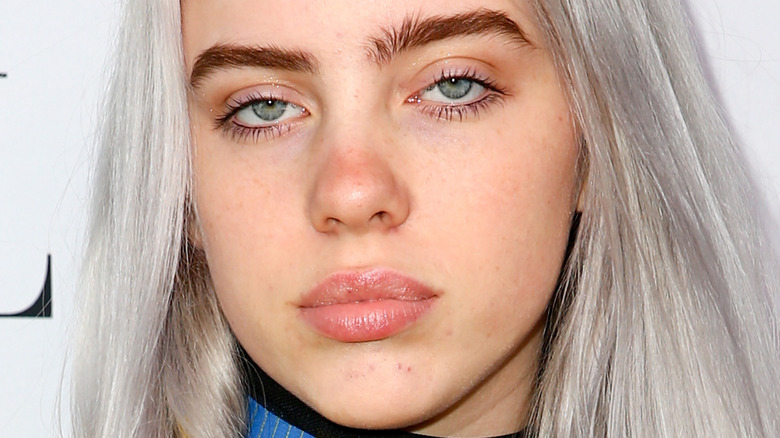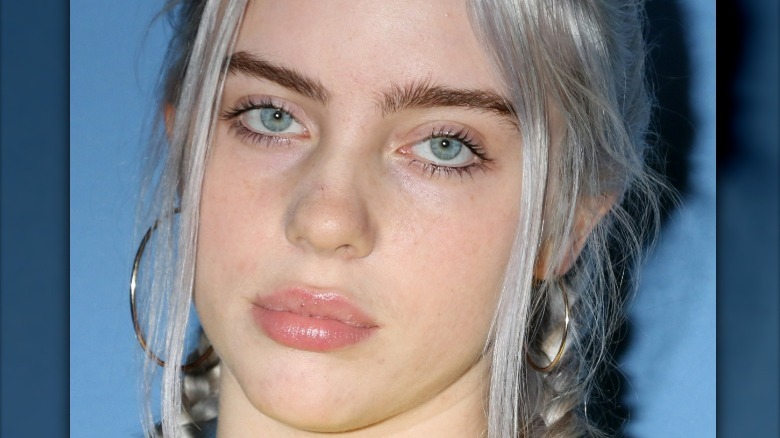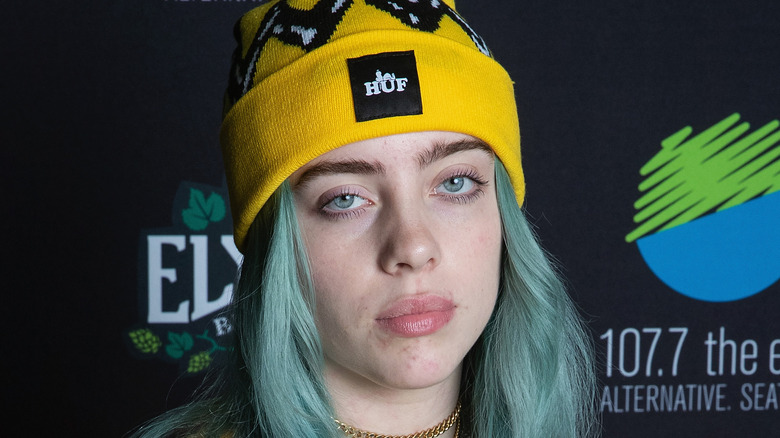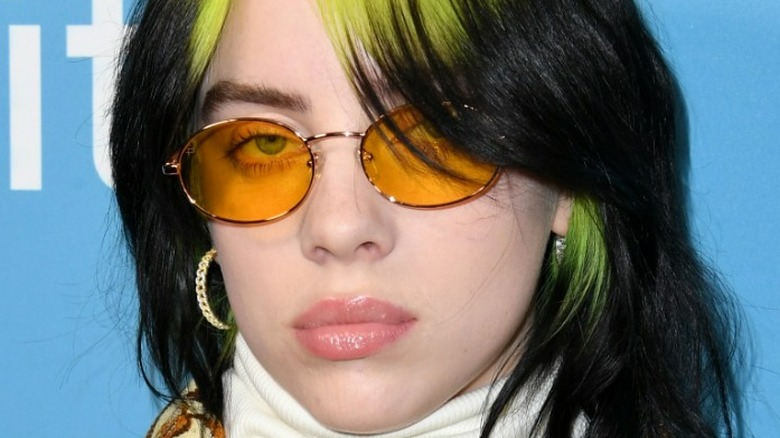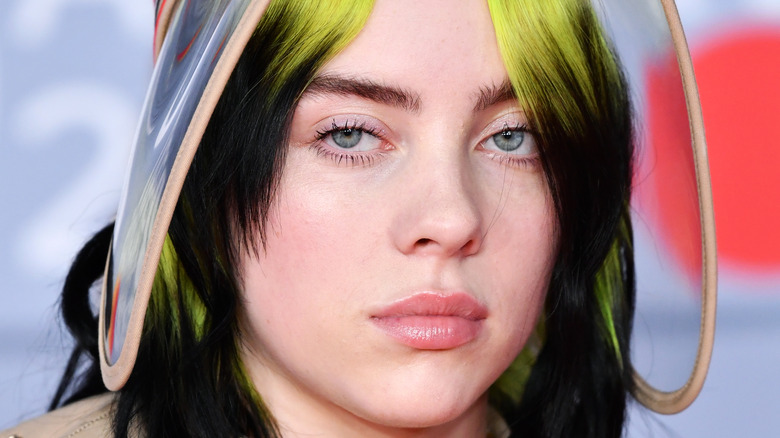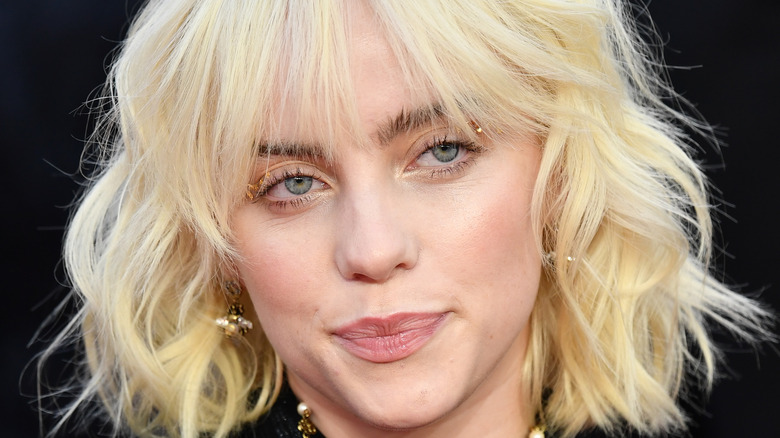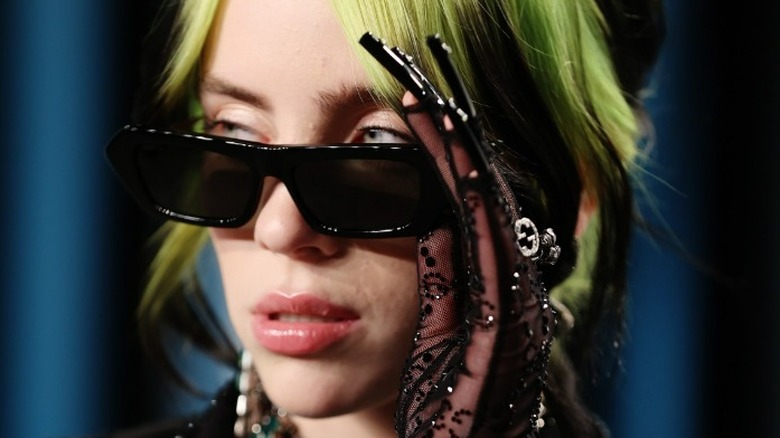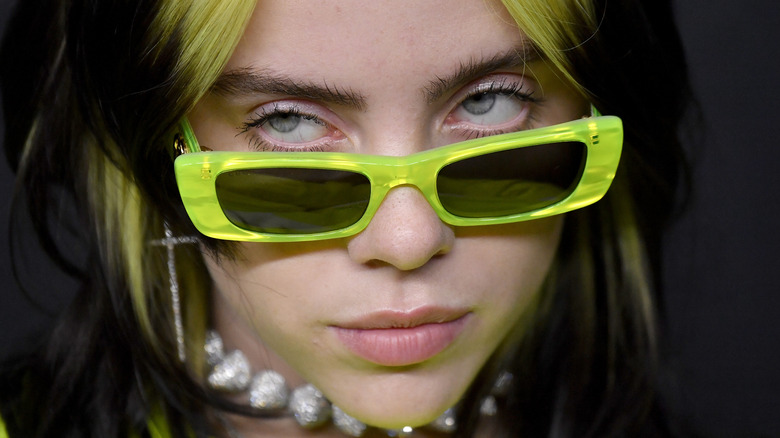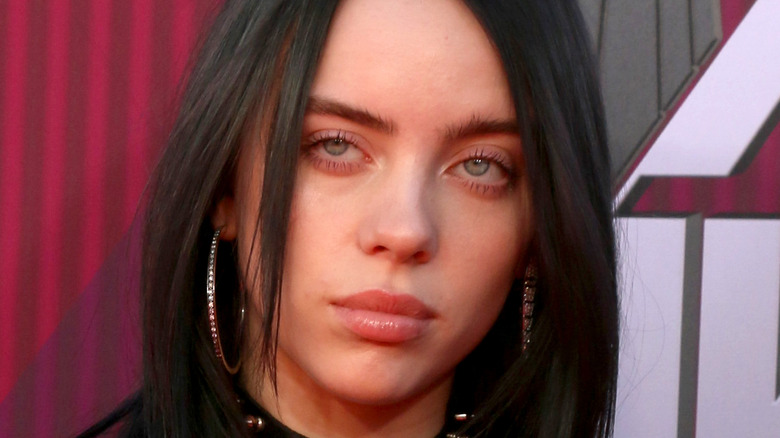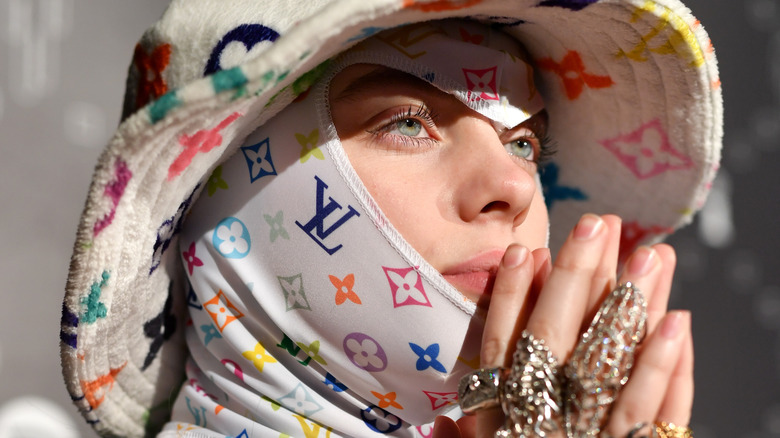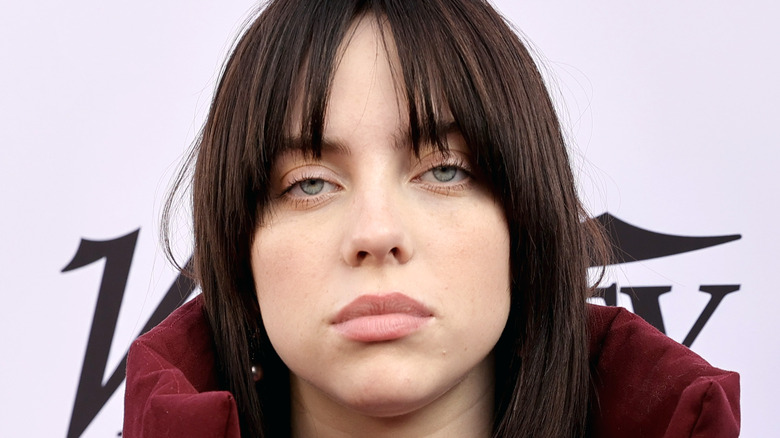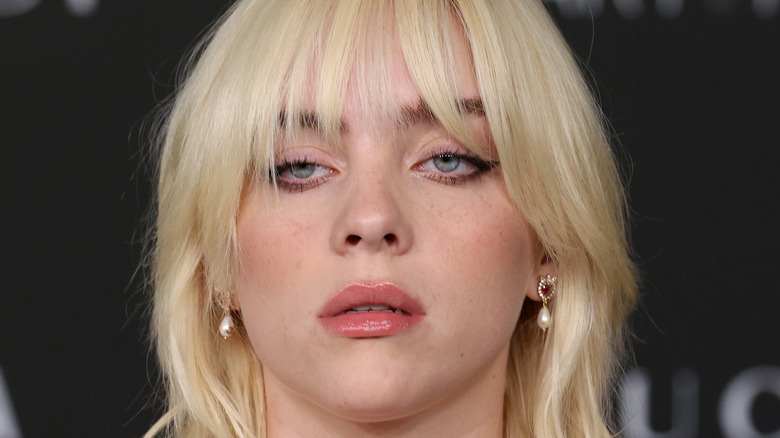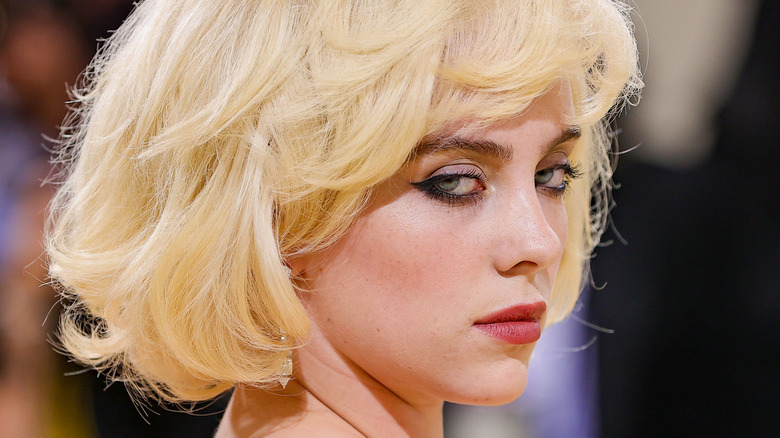Tragic Details About Billie Eilish
The following article includes mentions of domestic abuse, sexual violence, suicidal ideation, self-harm, and mental health issues.
As one of the youngest and most creative pop stars of her generation, some of the more tragic details about Billie Eilish can sit especially uncomfortable because of the star's age. Having been seemingly ushered into superstardom after achieving viral fame at just 13 with the release of seasick love song "Ocean Eyes," Eilish has encountered just as much of the dark side of fame and success as she has the light. There's nothing easy about being a teenager — and growing up in the public eye comes with additional challenges that the music star has remained painfully candid about.
On top of pouring the anguish of her hardships and personal experiences into her art — and in a way which may bring compassion and comfort to others experiencing similar ones — Eilish has also managed to maintain some perspective on her troubles, and has seemingly downplayed many of her personal difficulties. In an interview with Paper, for instance, she once struggled to explain what the "hardest thing" she'd ever had to write about was, and said, "I haven't gone through a lot of terrible stuff." Regardless, Eilish's own anecdotes and confessions suggest otherwise.
So please: Throw on the biggest, most oversized hoodie in your closet and hit the switch of your inner-reading voice to "ethereal pop whisper," because these are all the tragic details about Billie Eilish, which may add a little more context to musician's already impressive body of work.
She experienced body dysmorphia as a teenager
Growing up, Billie Eilish was focused on one keen goal: Dance. As described in a Rolling Stone profile, the singer had been "dancing seriously for several years" when she joined a competitive dance company full of "really pretty girls" at age 12, prompting a major crisis of insecurity. As she explained to the magazine, the "tiny clothes" she had to wear for performances severely distorted her body image — and her mental health with it. "That was the peak of my body dysmorphia," Eilish said. "I couldn't look in the mirror at all."
It's an issue which Eilish has impressively qualified into her unique sense of oversized style. Her roomy fashion choices are strategic, and a way to prevent anyone from seeing and judging her body, as she made clear during the "I Speak My Truth" Calvin Klein campaign (via Teen Vogue). Sadly, as of 2021, the music star continues to struggle with these issues.
Speaking to The Guardian that year, Eilish pinpointed how being part of an industry where "what looks real can be fake" when it comes to women's bodies makes her "feel really bad" as a person who remains unhappy with her body. Furthermore, her disorder can be so severe that she mentally detaches from her physical form to cope. The "Male Fantasy" singer explained that when performing on stage, "I have to disassociate from the ideas I have of my body."
Billie Eilish's mental health struggles
During her time in the limelight, Billie Eilish's mental health struggles are something that she's remained candid about. In 2019, for instance, the star — then 17 — recollected how her first major experiences with depression stemmed from a "devastating" dance injury which forced her to quit at 16. "It sent me down a hole," she admitted to Rolling Stone. "I went through a whole self-harming phase. ... I felt like I deserved to be in pain."
Her struggles sadly continued as she became a worldwide superstar. During "The Gayle King Grammy Special" in 2020, Eilish confessed to experiencing anxiety and heightened depression aged 17, which led to more self-harm and suicidal ideation. "I genuinely didn't think I would make it to 17," she told King, noting that her sudden fame left her feeling isolated and lonely, which she dealt with through therapy and the support of her family. And by all accounts, Eilish has attempted to extend the same support to her fans.
On top of delivering motivational PSAs — such as Ad Council's "Seize the Awkward," where she reminded fans that asking for help "doesn't make you weak" — Eilish also isn't afraid to write and publish "songs about being depressed or suicidal," as she believes they're a tonic for others. "Kids use my songs as a hug," the singer-songwriter told Rolling Stone in 2019. "... I feel that seeing that someone else feels just as horrible as you do is a comfort."
If you or someone you know is struggling with mental health, please contact the Crisis Text Line by texting HOME to 741741, call the National Alliance on Mental Illness helpline at 1-800-950-NAMI (6264), or visit the National Institute of Mental Health website.
If you or anyone you know is having suicidal thoughts, please call the National Suicide Prevention Lifeline at 1-800-273-TALK (8255).
Some people discredited the singer's heartbreak
There may not be anything groundbreaking about a teenager writing about heartbreak. But then, not every teenager writes hit songs with quite as much pain or darkness as Billie Eilish. For much of her early work, the musician confessed to Paper that her songs were inspired primarily by a "boy who tore up [her] whole self" and who had a "huge effect" on her. "He was terrible and he treated me terribly," she told the magazine. "I've written a gazillion songs about him." And apparently, some listeners were very dismissive of her feelings.
Speaking to the NME, Eilish suggested she was infuriated by people rolling their eyes about her hurting so extremely over "a boy," and of being too young to understand "love." As she explained, however, when you're young, so many powerful feelings are experienced for the first time and can feel earth-shattering. Older folks might forget how that feels — perhaps because "when you grow up, your heart dies," as Ally Sheedy's character put it in "The Breakfast Club."
"[Older people are] used to love, heartbreak, pain and just wanting to f**king die," Eilish told NME, "but for a younger person that's all new to you and it's terrifying." Her formative tracks like "Ocean Eyes" and many of the heart-bled bangers from "When We All Fall Asleep..." suggest that Eilish experienced all of those feelings very intensely. And whether they were inspired by "just a boy" or not, her anguish remains vivid and valid.
Billie Eilish experienced abuse as a minor
Standard apocalyptic-teenage-heartbreak aside, Billie Eilish also sadly experienced the extreme realities of domestic abuse as a young woman, too. The "Bury a Friend" singer opened up about her experiences during an interview with Vogue, wherein she reflected on a relationship she had as a minor with an older man, where she felt like she was exploited because of her youth. As Eilish matured, she better understood that what she went through was abuse.
Speaking about how even "very confident and strong-willed" girls can find themselves trapped in scenarios of domestic abuse or "statutory rape," she confessed that realizing she was a victim was "humiliating and demoralizing." "[You think] you know so much," she told Vogue, "and then you realize, I'm being abused right now." Eilish explored the topic in the 2021 song "Your Power," where her lyrics admonish an older man for swearing that he "didn't know" the age of the girl he was dating. "You ruined her in a year," she intones in the tune (via Genius), "Don't act like it was hard."
As Eilish explained to The Guardian, though the song obviously stemmed from personal experiences, it wasn't directly aimed at one person, nor was it necessarily only about herself. "I had multiple people I was thinking about in that song, which is sad," she said. "Some lines have nothing to do with me, they're just things I've seen, or things my friends have gone through."
If you or someone you know is dealing with domestic abuse, you can call the National Domestic Violence Hotline at 1−800−799−7233. You can also find more information, resources, and support at their website.
If you or anyone you know has been a victim of sexual assault, help is available. Visit the Rape, Abuse & Incest National Network website or contact RAINN's National Helpline at 1-800-656-HOPE (4673).
She says that porn 'destroyed' her brain
There have been countless studies committed to the suggestion that hardcore pornography can be harmful to children and young adults. On top of normalizing sexual harm and violence, it can also contribute to unhealthy expectations and behaviors in relationships. Billie Eilish apparently experienced all of that firsthand, as she confessed to having "started watching porn" when she was just 11.
The star made the shocking admission during a guest appearance on "The Howard Stern Show" in 2021, where she called porn "a disgrace" and expressed her devastation at having been "exposed to so much" of it at such a young age. As Eilish told the controversial shock-jock, she felt that the content she'd seen had "really destroyed [her] brain," as well as her ability to understand and consent to healthy sexual behaviors. "The first few times I ... had sex, I was not saying no to things that were not good," she said. "It was because I thought that's what I was supposed to be attracted to."
Eilish's comments join an ongoing dialogue about how exposure to or enjoyment of some pornography can heavily distort and tarnish real-life sexual enjoyment. In 2009, for instance, entrepreneur Cindy Gallop introduced her "Make Love Not Porn" movement during a viral TED Talk on the topic. The movement, which continues strong today, advocates for healthier sexual content that promotes realistic education around consent and behaviors, and better depictions of positive sexual experiences.
If you or anyone you know has been a victim of sexual assault, help is available. Visit the Rape, Abuse & Incest National Network website or contact RAINN's National Helpline at 1-800-656-HOPE (4673).
The sleep disturbances that inspired her debut
During her interview on "The Howard Stern Show," Billie Eilish also attributed her exposure to violent pornography as contributing to her experiences with sleep paralysis and night terrors. Previously speaking to Zane Lowe for Apple Music's Beat 1, the artist revealed that extreme nightmares sadly happened to her on the regular. On top of having suffered "really bad night terrors" her whole life, the star also shared that she'd "had sleep paralysis five times."
Like the Nancy Thompson of pop music, however, Eilish found a way to gain control over her nightmares by taking the reigns of her imagination and guiding herself to safety. "All my dreams are lucid, so I can kind of control them," she told Lowe, and confirmed that her debut album "When We All Fall Asleep, Where Do We Go?" was directly inspired by the fray of her disordered dream journeys.
The singer's ghoulish hit track "Bury a Friend," in particular, was said to be especially inspired by the terrors at the nether regions of her sleep. While on the one hand being sung from the perspective of a monster under the bed, as confirmed during a YouTube Music interview, Eilish told OK! (via Uproxx) that the song probably wouldn't be "the way it is" without her having endured "sleep paralysis and nightmares" first. Sweet dreams...
Billie Eilish's hidden neurological disorder
In 2018, Billie Eilish took to her Instagram Stories to address a series of "compilations" that fans had made and shared of her tics to confirm her truth: She has "diagnosed Tourette's." As reported by Billboard, Eilish wrote how the neurological disorder results in tics that "are only physical and not super noticeable to others," and that she has particular processes for "suppressing" and helping to "reduce them."
While it's obviously not tragic that the "Everything I Wanted" singer has Tourette's, there's something poignant to the fact that Eilish felt guarded about allowing her tics to be seen publicly. During an appearance on "The Ellen DeGeneres Show" in 2019, however, she revealed that despite having "lived with [the condition her] whole life," she kept her tics to herself, as she didn't want to be defined by them or known as "the artist with Tourette's."
Instead, her involuntary physical gestures could be timed in such a way to remain hidden. During "pre-taped" interviews, for instance, she explained that "they cut out the questions," giving her an opportunity to "let [her tics] out." A profile with The Guardian further proposed that Eilish's tics are triggered by stress, prompting a physical response wherein "she tics, her head flicking, her eyes pulling wide." The condition is shared by her father who "also has tics," as she explained to the newspaper, before adding that she has Tourette's "more severe than he does."
The COVID-19 vaccine saved her life
Having had to cancel her "Where Do We Go" tour dates at the beginning of the COVID-19 pandemic (via NME), Billie Eilish spent much of 2020 encouraging her fans to take the severity of the virus seriously. As reported by Insider, for instance, the singer took to her Instagram Stories to remind her fans, "Don't panic, but don't be an idiot," in responding to the pandemic responsibly. Later that year, she shared another Instagram Story, where she criticized people for living it up in lockdown. "Funny how I haven't hugged my best friends in six months," Dazed reported Eilish as saying, "and y'all are out here partying."
During her appearance on "The Howard Stern Show" in December 2021, Eilish sadly revealed that she'd personally suffered a debilitating bout of COVID-19. "It was terrible," she said. "I still have side effects. I mean, I was sick for like two months almost." Although her breakthrough case of the virus was admittedly "bad," she confirmed to Howard Stern that she "wasn't going to die" and made it "clear" as to why: She'd been jabbed. "I think if I weren't vaccinated, I would have ... died, because it was that bad," Eilish explained, adding that the vaccine ensured that her brother Finneas, parents, and closest friends were also protected from catching it from her.
The artist mourned the deaths of two of her biggest fans
For the entirety of her young career, Billie Eilish has had an extremely close connection with her fans — more so than the average pop star. Speaking to The Guardian, the singer-songwriter confessed, "When it comes to fans ... I don't really know how to keep a boundary," before calling them her "number-one priority." A fact established "since the beginning" of her career.
It goes some way to explaining just how devastated Eilish was upon hearing of the deaths of two of the star's biggest superfans in 2019. As reported by PopBuzz, she "shared a heartfelt tribute" to a pair of fans known as Skylar Davies and Kira on Instagram in 2019. The singer first paid tribute to Davies in an Instagram Story, where she wrote, "My heart is shattered," before sending love to "Skylar's friends and family."
Eilish then quickly found out that a second fan, Kira, had also died. "I hate this," she wrote. "I don't know how I am just finding out. ... I love you so much Kira. Please fly high." Though both causes of death had not been made public, the Daily Mail reported that Davies had died suddenly on Boxing Day 2019. On Instagram, the 19-year-old had shared pictures of having met Eilish earlier that year with the caption, "Last night I met the love of my life & I am forever grateful."
Billie Eilish faced backlash for bereavement
Sadly, not all of Billie Eilish's young experiences with mourning were quite as simple. In 2018, the artist found herself criticized for paying tribute to her late friend, the controversial rapper XXXTentacion, after he was shot dead at the age of 19, per TMZ. As reported by Complex, Eilish performed a song written for XXX, with the title "6.18.18" — a reference to the date he died. Dedicating the track to "a very powerful person," Eilish said, "He was always there for me ... he made me feel OK when nothing else did."
It would have been a straightforward sentiment if not for the fact that XXXTentacion was awaiting trial on domestic violence charges when he died. A secret recording obtained by Pitchfork even appeared to reveal the late rapper confessing to the violence he was alleged to have caused to his ex-girlfriend. In light of these allegations, Eilish's public affection for the rapper — before and after his death — didn't sit well with some fans and critics.
Nylon, for instance, called the singer's insistence to "prioritize her personal relationship" with XXX over the accusations against him "deeply unsettling." They added that "the message" her tributes send are that "women's claims of abuse are meaningless when the alleged abuser has powerful friends." Clearly, the backlash hurt. Speaking to The New York Times in 2019, Eilish suggested she felt "shamed" for mourning her friend, adding, "I don't think I deserve getting hate for loving someone that passed."
If you or someone you know is dealing with domestic abuse, you can call the National Domestic Violence Hotline at 1−800−799−7233. You can also find more information, resources, and support at their website.
She's struggled with online trolls
The backlash she received over her public tributes to XXXTentacion were a smaller symptom of a larger issue for the star: The suffocating nature of constant online scrutiny and attacks. Throughout her career, Billie Eilish has endured a complicated relationship with social media. While on the one hand it allows her the intimate space with which to engage with her beloved fans, on another it leaves her vulnerable to receiving a flood of criticism and abuse.
In 2019, the singer even revealed to NME that the extent of the provocations she's experienced online forced her to step back from using social media — not reading every comment or DM she receives like she used to, and even deleting her Twitter account. "I just don't wanna see all the horrible things people say," Eilish said. "I don't wanna see that I should have died instead of this artist. It takes not looking at my phone to stop myself from engaging."
The internet, and more specifically "the bunch of trolls" seemingly at the heart of it, were "ruining [her] life," as she told "BBC Breakfast" (via Metro). On top of weathering her well-being, reading constant negativity about herself appeared to be wearing the young artist down — particularly whenever she's attempting to do something positive. "What is the point of trying to do good," Eilish reasoned to BBC News, "if people are just going to keep saying that you're doing wrong?"
Billie Eilish obtained restraining orders against stalkers
Online trolls can be hurtful, but in real life, similar elements can be absolutely terrifying. Speaking to The Guardian in 2021, Billie Eilish made the disturbing admission that she "has a lot of stalkers" and "people that want to do bad things" to her, so she stays at her parents' house for safety "a lot." However, the star had been open about her "traumatizing" experiences with people infringing on her personal space as far back as 2019, as reported by Rolling Stone.
Back then, the address of the Eilish family home was leaked on the internet, prompting arrivals from fans, as well as "a creepy older guy" who had apparently driven hours just to attempt contact. They had to hire a bodyguard, and as a result, Eilish told the publication, "I completely don't feel safe in my house anymore, which sucks." The young star has experienced such extreme cases of stalking that she's even had to implement restraining orders against people.
In 2020, for instance, a judge granted a temporary restraining order against "an obsessed fan" who reportedly kept attempting to gain entry to Eilish's home, according to TMZ. And again in 2021, a judge granted the "Happier than Ever" hitmaker a restraining order against another stalker who was allegedly harassing her. As reported by NBC News, the man in question was accused of lurking outside Eilish's home and making death threats against the young star, who stated in court documents, "I no longer feel safe going outside my home."

